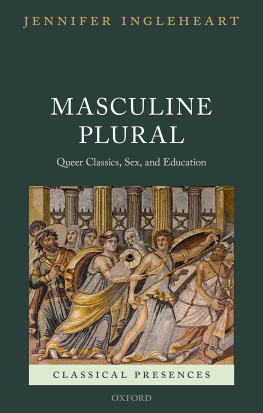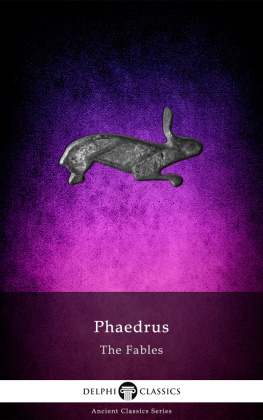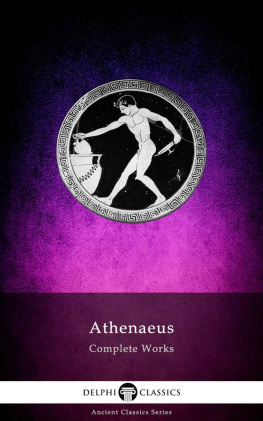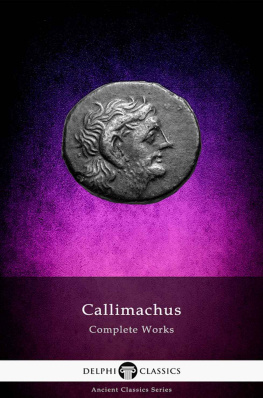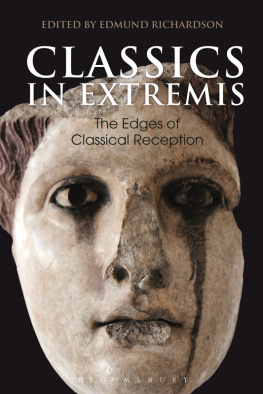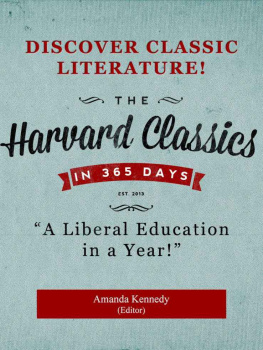lorna hardwick james i. porter
Classical Presences
Attempts to receive the texts, images, and material culture of ancient Greece and Rome inevitably run the risk of appropriating the past in order to authenticate the present. Exploring the ways in which the classical past has been mapped over the centuries allows us to trace the avowal and disavowal of values and identities, old and new. Classical Presences brings the latest scholarship to bear on the contexts, theory, and practice of such use, and abuse, of the classical past.

Great Clarendon Street, Oxford, OX2 6DP, United Kingdom
Oxford University Press is a department of the University of Oxford. It furthers the University's objective of excellence in research, scholarship, and education by publishing worldwide. Oxford is a registered trade mark of Oxford University Press in the UK and in certain other countries
Jennifer Ingleheart 2018
The moral rights of the author have been asserted
First Edition published in 2018
Impression: 1
All rights reserved. No part of this publication may be reproduced, stored in a retrieval system, or transmitted, in any form or by any means, without the prior permission in writing of Oxford University Press, or as expressly permitted by law, by licence or under terms agreed with the appropriate reprographics rights organization. Enquiries concerning reproduction outside the scope of the above should be sent to the Rights Department, Oxford University Press, at the address above
You must not circulate this work in any other form and you must impose this same condition on any acquirer
Published in the United States of America by Oxford University Press 198 Madison Avenue, New York, NY 10016, United States of America
British Library Cataloguing in Publication Data
Data available
Library of Congress Control Number: 2018937429
ISBN 9780198819677
ebook ISBN 9780192551610
Printed and bound by CPI Group (UK) Ltd, Croydon, CR0 4YY
Links to third party websites are provided by Oxford in good faith and for information only. Oxford disclaims any responsibility for the materials contained in any third party website referenced in this work.
For my wife
Acknowledgements
It is a great pleasure to thank the many people who have helped me in the researching and writing of this book. I was first introduced to Philip Gillespie Bainbrigge by my Durham colleague Peter Heslin while I was working on the reception of Rome in Victorian erotica. Peter suggested that I might find an interesting topic in Bainbrigges private writings, and I am very grateful indeed to him for this suggestion, and for commenting perceptively on early drafts of some of this material. A number of current/former Durham colleaguesGeorge Boys-Stones, Phillip Horky, Luke Pitcher, and Ed Richardsonalso read some or all of my earlier drafts, and their learned and kind comments have been invaluable to me; I am most grateful to them for sharing their knowledge and time.
Chris Stray, too, has commented on an earlier draft, and patiently answered many queries from me; this book has been much improved by his generous sharing of his expertise and insights, and I owe him many thanks. I would also like to thank Peter Parker, who kindly answered my questions about the Edinburgh Production of Achilles in Scyros, and even more generously commented on a late draft of the entire manuscript.
I am most grateful to Jean Findlay for sharing with me, at a crucial stage in my project, materials she holds on Bainbrigge and Scott Moncrieff, and responding to various queries. My heartfelt thanks are also due to Liam Sims of Cambridge University Library, who has shared with me his invaluable expertise (particularly on A. T. Bartholomew and the Arc. collection), and made extremely helpful comments on drafts at various stages in this project. I would also like to thank for their help with archival research the following curators, librarians, and archivists: Jonathan Smith of Trinity College, Cambridge; Eleanor Cracknell and Roddy Fisher of Eton College; Robin Brooke-Smith and Mike Morrogh of Shrewsbury School; Suzanne Foster of Winchester College; Catherine Smith of Charterhouse; Anna Sanders of Balliol College, Oxford; Mark Bainbridge of Worcester College, Oxford.
My thanks are also due to the Harry Ransom Center in Austin, Texas, for awarding me a 201617 Research Fellowship in the Humanities, supported by the Andrew W. Mellon Foundation Research Fellowship Endowment. This enabled me to carry out crucial archival work on Scott Moncrieffs letters to Vyvyan Holland.
Audiences at seminars at Durham Universitys Department of Classics and Ancient History and at St. Andrews made helpful comments on earlier drafts of chapters from this volume, as did audiences at the LGBT History Month festivals in 2016 at Shrewsbury and Newcastle.
At Oxford University Press, Lorna Hardwick, James Porter, and Charlotte Loveridge have been unfailingly helpful and supportive of this project. The Readers for the Press have also helped to improve this volume in many ways, and I am most grateful to them for their suggestions. My thanks are also due to my copy editor, Donald Watt.
I also owe thanks for contributions of various kinds to: Maggie Asquith, Aelred Baker, Alan Beale, Alastair Blanshard, Edward Bragg, Timothy dArch Smith, Claire Davenport, the late Peter Derow, Anabel Farrell, Peta Fowler, Henry Hardy, Alison Hennegan, Charlotte Heppell, Merlin Holland, Lucy Hughes, Scott Jacobs, Patricia McGuire, Peter Monteith, Fiona Mynors, Bill Naquin, Harriet Patrick, Andrej Petrovic, Ivana Petrovic, Julian Reid, Peter Roscoe, Philippa Seale, Jennifer Thorp, Crispin Tickell, Peter Wilkes, and Mark Woolmer.
Finally, I would like to thank my wife Wendy and our son Rufus for their help, support, and love while I was engaged on this project.
Jennifer Ingleheart
Durham
12 December 2017
Contents
The literary reputation of the schoolmaster Philip Gillespie Bainbrigge (18901918) rests almost entirely on a single First World War sonnet anticipating his own death at the front, a parody of his acquaintance Rupert Brookes more famous The Soldier; Bainbrigges sonnet has been reproduced in several anthologies of war poetry. Bainbrigge himself appears regularly, if fleetingly, in biographies of Wilfred Owen, with whom he became friends in the final year of his life, and on whose verse he had a galvanic effect, spurring Owen to a period of intense creativity and open treatment of homoerotic desire. Bainbrigge even makes a cameo appearance in the novelist Pat Barkers recent fictional treatment of Owen and other war poets. In a scene which draws on Owens letters and quotes verbatim from Bainbrigges sonnet, Barker gives a flavour of the latters poetic (and other) interests:
Bainbrigges dead. I remember him in the oyster bar in Scarborough a couple of nights before we left. We were all pissed, but Bainbrigge was pissed enough to quote his own poems (than which there is no pisseder). He was talking to Owen, saying real anti-war poems ought to celebrate what war deprives men ofwait for itBeethoven, Botticelli, beer and boys. Owen kicked him under the table, for my benefit, I think.
But Bainbrigge is much more than a minor war poet who deserves only a footnote in lives of the more famous Owen; this volume aims to show that Bainbrigges literary achievement and importance for the history of sexuality go far beyond his authorship of a single, if well-regarded sonnet, as it reprints and examines two of his works which circulated clandestinely in his lifetime. These were then published posthumously in private, limited editions by his best friend and lover, Charles Kenneth Scott Moncrieff, during the period in which he was establishing his own literary reputation, as the translator of Proust.

